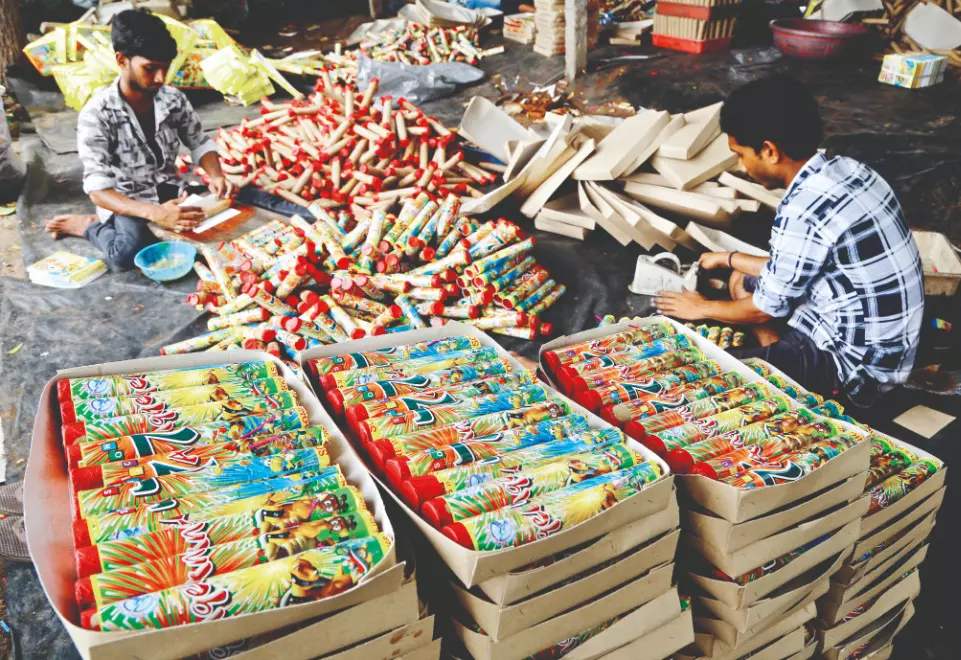‘Complete ban not practical or ideal’: SC hints at partial relaxation on firecracker ban

New Delhi: Days before Diwali celebrations, the Supreme Court on Friday observed that a complete prohibition on firecrackers in Delhi-NCR was “neither practical nor ideal”, noting that such bans were often flouted and calling for a “balancing of equities” between environmental protection and citizens’ right to celebrate festivals.
A bench of Chief Justice B R Gavai and Justice K Vinod Chandran made the remarks while reserving its verdict on a series of petitions seeking permission to manufacture and sell “green” firecrackers in the National Capital Region. The court’s observations suggested the possibility of partial relaxation of the blanket ban that has been in place since 2018.
“Despite a complete ban, firecrackers continue to be used. Extreme orders create problems,” Chief Justice Gavai said, adding that the court sought a “balanced solution” that protects both environmental interests and livelihoods.
During the hearing, the bench questioned whether the ban had made any measurable difference to air quality in the region. “Has the air quality index improved or worsened since 2018? Was the pollution much less then compared to now?” the Chief Justice asked.
Solicitor General Tushar Mehta, representing the Centre and NCR states, cited data from the Commission for Air Quality Management (CAQM) showing that pollution levels had remained “more or less the same,” except during the COVID-19 lockdown when industrial and vehicular activities were suspended. “Let the children celebrate for two days. It is only for festivals like Diwali, Gurpurab, and Christmas,” Mehta urged, adding that even limited celebration windows could be allowed.
The bench heard extensive arguments from multiple stakeholders, including the Union and Delhi governments, firecracker manufacturers, environmental activists, and the amicus curiae. Mehta proposed that the court permit limited use of NEERI-certified “green crackers” during major festivals under strict regulation.
“We are suggesting a balanced approach. The idea is not to deny people their right to celebrate but to ensure that celebrations are responsible,” he said. He recommended that only licensed traders be allowed to sell approved crackers, while e-commerce sales through platforms such as Amazon and Flipkart remain banned.
The Solicitor General also presented a set of guidelines proposed by NCR states and the Petroleum and Explosives Safety Organisation (PESO). These included banning joint firecrackers (laris), requiring QR codes for every approved green cracker, and mandating regular inspections by PESO, NEERI, and state pollution boards to detect banned chemicals like barium, arsenic, and lead.
He further suggested fixed time slots for bursting firecrackers: from 8 pm to 10 pm on Diwali, 4 am to 5 am and 9 pm to 10 pm on Gurpurab, and 11:55 pm to 12:30 am on Christmas and New Year’s Eve.
Chief Justice Gavai acknowledged that regional customs would also need consideration. “In some parts of India, Diwali is celebrated in the morning,” he noted, indicating that the court may account for such variations while framing its order.
The bench revisited the landmark Arjun Gopal vs Union of India judgment of 2018, which had first permitted the use of green crackers under specific time restrictions. “We will revisit Arjun Gopal, with modifications suggested by both the Union and the amicus, to strike a fair balance,” the Chief Justice said.
Senior Advocate Aparajita Singh, appearing as Amicus Curiae, flagged the growing issue of counterfeit green crackers being sold under false labels, many of which still contained banned chemicals. She proposed random testing by police and PESO to identify violators and recommended a “Green Cess” to discourage non-compliant products.
Justice Chandran echoed concerns about the firecracker industry’s economic distress. “It’s not just the manufacturers; marginalised communities depending on this industry are facing severe hardship,” he observed, supporting Singh’s proposal for random checks to curb misuse while protecting legitimate businesses. Senior Advocate K Parameshwar, representing manufacturers, appealed to the court to allow continued production of certified green crackers under strict supervision. He assured that manufacturers were prepared to publish production details online to ensure full transparency. The case stems from the court’s September 26 order permitting certified manufacturers to produce green crackers while barring their sale in Delhi-NCR without explicit approval. The court had then directed the Centre to reassess the region’s blanket ban on firecracker manufacturing.
Additionally, the Chief Justice reiterated the need for a pragmatic approach that balances health concerns, cultural practices, and economic realities.



